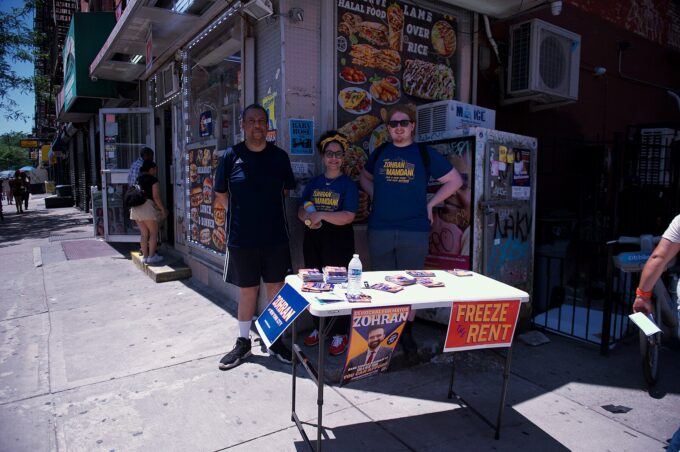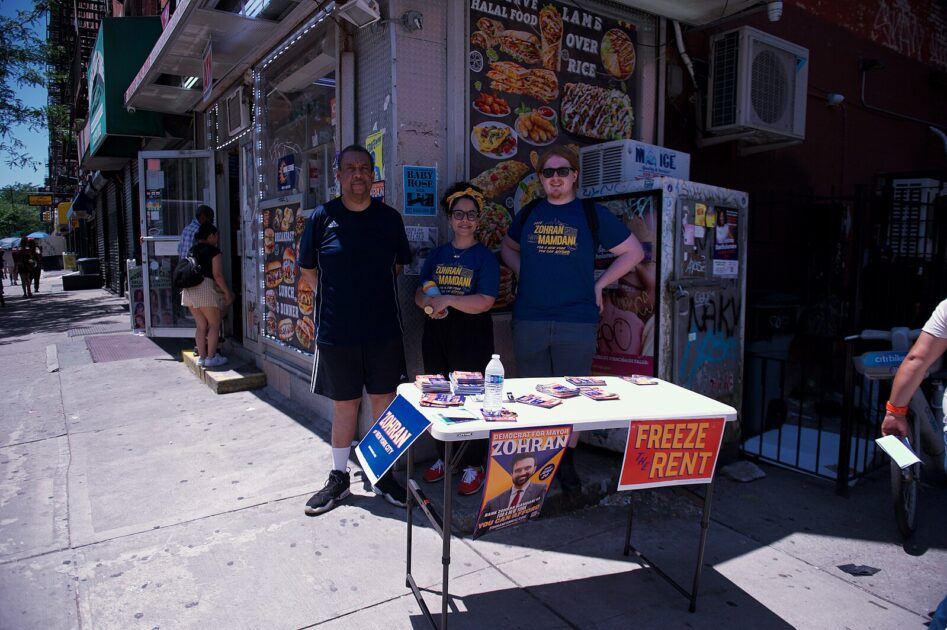






























































Photograph Source: SWinxy – CC BY 4.0
Split Screen: On one side is the current president of the United States striding to a microphone to tell how the U. S. military had bombed Iran. Behind him are the Vice President, Secretary of State and Secretary of Defense, all white males in very starched white shirts. “A short time ago, the U.S. military carried out massive precision strikes on the three key nuclear facilities in the Iranian regime: Fordo, Natanz, and Isfahan,” DJT proudly announces. “Tonight, I can report to the world that the strikes were a spectacular military success.” On the other screen is a little known 33 year-old Muslim democratic socialist, born in Uganda, in a Queens rooftop bar celebrating a “spectacular and decisive upset” win over ex-Governor Andrew Cuomo in the New York Democratic mayoral primary. “A life of dignity should not be reserved for a fortunate few,” Zohran Mamdani tells hundreds of jubilant supporters. “It should be one that city government guarantees for each and every New Yorker,” he promises.
Instead of secretive planning with a select few for an illegal bombing, Mamdani publicly campaigned, walking 13 miles in the streets of Manhattan, talking with and hugging people he met along the way. Trump declared the bombings on television backed by Vance, Rubio, and Hegseth; Mamdani hit the streets of New York and later visited Al Sharpton’s National Action Network in Harlem to further reach out to all of New York’s various communities.
On one screen, muscle flexing, testosterone high, white males showing off their physical and verbal power, believing that force will solve the world’s complex problems. On the other screen, a seeming “normal human being” connecting face-to-face with as many different groups as he can in a transparent, democratic political process. “What does morning look like in this city?” Mamdani asked the crowd at Sharpton’s 145th Street headquarters, near where I once taught. “It must be a morning where the worker comes first, a morning where a New Yorker does more than just struggle,” he said.
On one screen arrogant, hubristic bros announcing the dubious triumph of military power in their attempt to control the world. On the other screen, a single, non-white man and former rapper talking to people about their simple day-to-day concerns such as affordable housing and free universal childcare. On one screen, domination and exclusion, a vertical form of outdated hegemonic colonialism; on the other screen, empathy and inclusion, a 21st century horizontal political sensitivity from someone who wore an unstarched South Asian kurta to his wedding.
Dealing with a potential nuclear war is obviously not the same as winning a Democratic primary to be mayor of New York City. Brokering some form of sustainable peace in the Middle East is not in the same as campaigning to fix potholes on the West Side highway. Granted, there are serious level-of-analysis problems here. But there is much to say about the images of the people on the split screens. There is much to say about the systemic process by which they reach decisions; who they include and who they exclude, and their priorities.
Who does Mamdani include? A June 10, 2025, poll by a Jewish newspaper “revealed that Mamdani is the second choice among Jewish voters, with 27% support among Reform Jews and 14% among Conservative Jews.” After the vote, Fact Check headlined; “Tens of thousands of New York Jews voted for Mamdani despite antisemitism accusations.” Not bad for a practicing Shia Muslim who has accused Israel of apartheid and genocide.
Perhaps the ultimate Mamdani backhanded compliment came from presidential insults and threats. Donald Trump said on Fox News that a Mamdani victory in the final election was “inconceivable” because he saw the candidate as “a pure communist.” Trump threatened: “Let’s say this – if he does get in, I’m going to be president, and he’s going to have to do the right thing, or they’re [New Yorkers] not getting any money,” DJT menaced in his typical Mafia fashion.
Mamdani responded that he “denied that he was – as the president said – a communist. But he reaffirmed his commitment to raise taxes on the wealthiest New Yorkers while saying: ‘I don’t think that we should have billionaires,’” The Guardian reported. As for labelling Mamdani a communist, Trump should realize that Red baiting is passé. The McCarthy era’s House Un-American Activities Committee (HUAC) was abolished in 1975. And, if needed, Ralph Nader reassured, “Mamdani’s agenda is no more socialist than that of FDR,” he wrote in Counterpunch.
As a born and raised New Yorker – and one who continues voting in U.S. elections from overseas– I find it encouraging that Mamdani was able to capture a different New York from the Trump/Wall Street/real estate giant highflyers who have come to dominate the Big Apple. Mamdani’s victory over Cuomo is a direct slap at: the world’s high-end fashion extravaganza, the Met Gala; restaurants like the three starred, overbooked Le Bernardin; the Upper East Side, Hampton’s/Martha’s Vineyard/Nantucket McMansions crowd. From 3874 miles away in Geneva, Switzerland, I find it encouraging that 430,000 fellow New Yorkers rose up against the Cuomo/Clinton/Obama/Harris bicoastal Democratic Party leaders’ elite ecosystem.
Binary distinctions are not always helpful. Nor are split screens. But Mamdani’s victory is a return to some form of democratic decency in, at least, New York City and its Democratic Party. While the victory will not erase all the horrors of this new Gilded Age – exemplified by the Bezos-Sanchez $50 million Venice wedding– it is a small light at the end of a very, very dark tunnel. There is no guarantee that Mamdani will win the upcoming mayoral contest, but Mamdani’s primary victory – the process as well as the result – is a hopeful sign. We desperately need some.
The post Another Tale of Two Uncle Sams: Mamdani’s Unexpected Win and Hope for a Democratic Democracy appeared first on CounterPunch.org.
This post was originally published on CounterPunch.org.